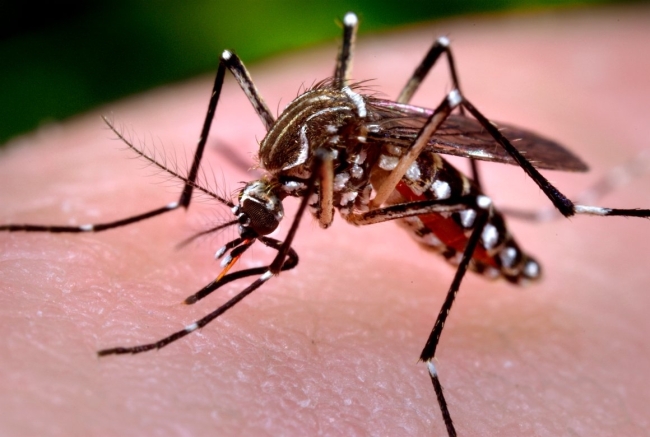
Photo; Greater L.A. County Vector Control District
Regarding Aedes Aegypti, LBDDHS states in a release:
The Long Beach Department of Health and Human Services (DHHS) Vector Control Program has detected Aedes aegypti, the type of mosquito that can transmit Zika, dengue, and other viruses, for the first time in Long Beach. While they have been found in several surrounding cities in Southern California, this marks the first detection of these mosquitoes in Long Beach.The Aedes aegypti mosquitoes were found in North Long Beach, where mosquito control is under the jurisdiction of the Compton Creek Mosquito Abatement District (CMAD). Long Beach Vector Control is working with the CMAD to evaluate the extent of the infestation and aggressively target problem areas to prevent the spread of these mosquitoes. They have deployed a variety of traps for adult mosquitoes and mosquito eggs surrounding the location where the mosquitoes were found and additional locations where they may be found.
"Our goal is to control this mosquito population," said Dr. Anissa Davis, City Health Officer. "We are doing everything to ensure this mosquito does not become established or thrive in our communities."
Zika virus is transmitted through the bite of an infected Aedes mosquito, but can also be transmitted through sexual contact and from a pregnant mother to her baby. Detecting the mosquitoes early on, before there is local transmission of the disease, will help to prevent Zika from being introduced into the community. There is currently no local transmission of Zika in California.
DHHS outreach workers are distributing educational materials to residents in the area where the mosquitoes were found, and will work with residents to identify and eliminate breeding grounds around the home.
Long Beach residents can play a critical role in helping to control the spread of this mosquito population. Aedes aegypti is a small (approximately a quarter inch), aggressive, black and white mosquito that distinctly bites during the daytime. Aedes aegypti can lay eggs just above the water line on the sides of small containers and vessels that hold water, such as dishes under potted plants, bird baths, ornamental fountains, tin cans, or discarded tires.
The following precautions will help reduce the chances of being bitten by mosquitoes:
- Empty any containers filled with water once a week
- Clean and scrub bird baths and pet water bowls
- Dump water from potted plant saucers
- Check rain gutters and lawn drains to ensure they are not holding water and debris
- Use mosquito repellent consistently when outside
- Wear long sleeves and pants when outdoors
- Ensure screens on doors and windows are in good repair
Residents are urged to report unusual numbers of mosquitoes, or day-biting mosquitoes, to the City’s Zika Hotline at (562) 570-7907. If you are sick with fever, headache, and joint or muscle pain after returning from an area where Zika, Dengue, or Chikungunya occurs, contact your doctor and stay indoors as much as possible to avoid mosquito bites and help prevent possible spread of the virus in Long Beach.
For more information about mosquitoes, visit: www.longbeach.gov/health, follow us on Facebook, Twitter, and Instagram, or call the Zika Hotline at (562) 570-7907.
Sponsor | Sponsor |
The Greater L.A. County Vector Control District has this page with details on this type of mosquito and says it has already been found in:
Artesia Avocado Heights (unincorporated LA County) Bell Bell Gardens Bellflower Boyle Heights (City of L.A.) Carson Central Alameda (City of L.A.) Cerritos City Terrace (unincorporated LA County) Commerce Cudahy Diamond Bar Downey East Hollywood (City of L.A.) East Los Angeles (unincorporated LA County) El Sereno (City of L.A.) Elysian Valley (City of L.A.) Florence/Graham (unincorporated LA County) Hacienda Heights (unincorporated LA County) Hawaiian Gardens Highland Park (City of L.A.) Historic South Central (City of L.A. – 90007) Huntington Park Lake View Terrace (City of L.A.) La Mirada Maywood Montebello Norwalk Pacoima (City of L.A.) Paramount Pico Rivera Rowland Heights Santa Fe Springs South Gate South Whittier (unincorporated LA County) Valley Village (City of L.A.) Willowbrook (unincorporated LA County)
Sponsor |  |
And below is a video:
Sponsor | Sponsor |
Sponsor |
blog comments powered by Disqus
Recommend LBREPORT.com to your Facebook friends:
Follow LBReport.com with:
RSS |
Contact us: mail@LBReport.com





Hardwood Floor Specialists
Call (562) 422-2800 or (714) 836-7050
